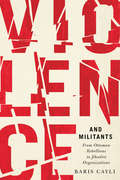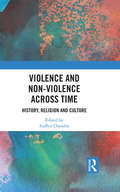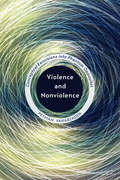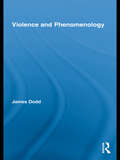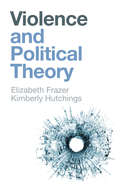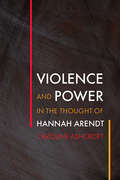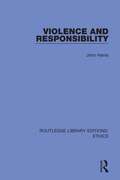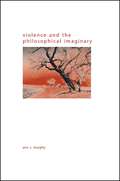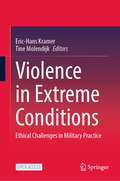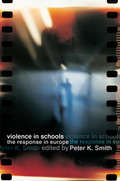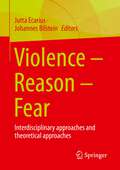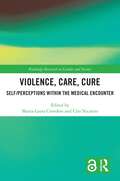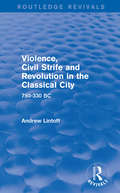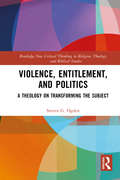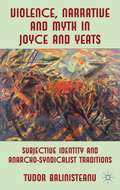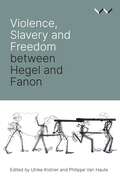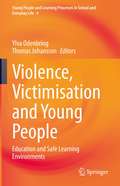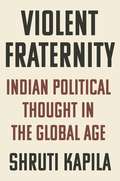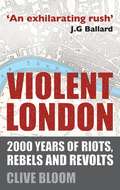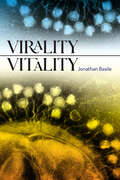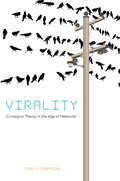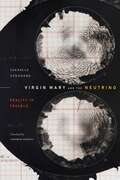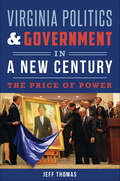- Table View
- List View
Violence and Militants: From Ottoman Rebellions to Jihadist Organizations (Human Dimensions in Foreign Policy, Military Studies, and Security Studies #6)
by Baris CayliHow do militants rationalize violence and what are their motives? How do time and space shape their destiny? In Violence and Militants Baris Cayli explores these enduring questions by comparing violent episodes in towns and villages in the nineteenth-century Ottoman Balkans with today's zones of conflict from Afghanistan to the Middle East. Placing history alongside the troubles of the present, Violence and Militants reveals parallels between Christian militants who rebelled against the Ottoman Empire and four jihadist organizations of today: Hezbollah, Hamas, al-Qaeda, and Isis. Drawing on scholarship by political theorists, historians, sociologists, anthropologists, and philosophers, Cayli traces the root of dissent to a perceived deprivation that leads to aggressive protest and action. He argues that the rationalization of violence functions independently of time and geographical location. Through a riveting narrative, this book uncovers how militant groups use revenge, ideals, and confrontation to generate fear and terror in the name of justice. Breaking new ground, Violence and Militants is the first book to address this complex relationship across different periods of history.
Violence and Non-Violence across Time: History, Religion and Culture
by Sudhir ChandraThis book probes the complex interweaving, across time and cultures, of violence and non-violence from the perspective of the present. One of the first of its kind, it offers a comprehensive examination of the interpenetration of violence and non-violence as much in human nature as in human institutions with reference to different continents, cultures and religions over centuries. It points to the present paradox that even as violence of unprecedented lethality threatens the very survival of humankind, non-violence increasingly appears as an unlikely feasible alternative. The essays presented here cover a wide cultural–temporal spectrum — from Vedic sacrifice, early Jewish–Christian polemics, the Crusades, and medieval Japan to contemporary times. They explore aspects of the violence–non-violence dialectic in a coherent frame of analysis across themes such as war, jihad, death, salvation, religious and philosophical traditions including Buddhism, Christianity, Judaism, Hinduism, Islam, mysticism, monism, and Neoplatonism, texts such as Ramayana, Mahabharata and Quran, as well as issues faced by Dalits and ethical imperatives for clinical trials, among others. Offering thematic width and analytical depth to the treatment of the subject, the contributors bring their disciplinary expertise and cultural insights, ranging from the historical to sociological, theological, philosophical and metaphysical, as well as their sensitive erudition to deepening an understanding of a grave issue. The book will be useful to scholars and researchers of history, peace and conflict studies, political science, political thought and cultural studies, as well as those working on issues of violence and non-violence.
Violence and Nonviolence: Conceptual Excursions into Phantom Opposites
by Peyman VahabzadehThrough an original and close reading of the key literature regarding both revolutionary violence and nonviolence, this book collapses the widely-assumed concepts of violence and nonviolence as mutually exclusive. By revealing that violence and nonviolence are braided concepts arising from human action, Peyman Vahabzadeh submits that in many cases the actions deemed to be either violent or nonviolent might actually produce outcomes that are not essentially different. Vahabzadeh offers a conceptual phenomenology of the key thinkers and theorists of both revolutionary violence and various approaches to nonviolence. Arguing that violence is inseparable from civilizations, Violence and Nonviolence concludes by making a number of original conceptualizations regarding the relationship between violence and nonviolence, exploring the possibility of a nonviolent future and proposing to understand the relationship between the two concepts as concentric, not opposites.
Violence and Phenomenology
by James DoddThis book pursues the problem of whether violence can be understood to be constitutive of its own sense or meaning, as opposed to being merely instrumental. Dodd draws on the resources of phenomenological philosophy, and takes the form of a series of dialogues between figures both inside and outside of this tradition. The central figures considered include Carl von Clausewitz, Carl Schmitt, Hannah Arendt, Jean-Paul Sartre, Ernst Jünger, and Martin Heidegger, and the study concludes with an analysis of the philosophy of Jan Patocka.
Violence and Political Theory (And Political Theory)
by Kimberly Hutchings Elizabeth FrazerIs politics necessarily violent? Does the justifiability of violence depend on whether it is perpetrated to defend or upend the existing order – or perhaps on the way in which it is conducted? Is violence simply direct physical harm, or can it also be structural, symbolic, or epistemic? In this book, Elizabeth Frazer and Kimberley Hutchings explore how political theorists, from Niccolo Machiavelli to Elaine Scarry, have addressed these issues. They engage with both defenders and critics of violence in politics, analysing their diverse justificatory and rhetorical strategies in order to draw out the enduring themes of these debates. They show how political theorists have tended to evade the central difficulties raised by violence by either reducing it to a neutral tool or identifying it with something quite distinct, such as justice or virtue. They argue that, because violence is necessarily wrapped up with hierarchical and exclusive structures and imaginaries, legitimising it in terms of the ends that it serves, or how it is perpetrated, no longer makes sense. This book will be an invaluable resource for students and scholars in areas ranging from the ethics of terror and war to radical and revolutionary political thought.
Violence and Power in the Thought of Hannah Arendt (Intellectual History of the Modern Age)
by Caroline AshcroftHannah Arendt was one of the foremost political theorists of the twentieth century to wrestle with the role of violence in public life. Yet remarkably, despite the fact that it was perhaps the most pressing issue of her era, this theme in her work has rarely been explored. In Violence and Power in the Thought of Hannah Arendt, Caroline Ashcroft deepens our understanding of Arendt's conception of the role of violence, offering a critical reading of her work and using it as a provocation to think about how we might engage with contemporary ideas.Arendt has generally been thought to exclude acts of violence from "the political," based on her supposed idealization of ancient democratic politics. Ashcroft argues that Arendt has been widely misunderstood by both critics and advocates on this. By examining Arendt's thought on violence in key examples of political practice such as modern Jewish politics, the politics of Greece and Rome, and the French and American revolutions, Ashcroft reveals a more pragmatic notion of the place of violence in the political. She argues that what Arendt opposes in political violence is the use of force to determine politics, an idea central to modern sovereignty. What Arendt criticizes is not violence as such, but the misuse of violence and misunderstandings of politics which exclude participatory power altogether.This work also engages with a wider set of concerns in political theory by obliging us to rethink the relations between violence and politics. Arendt's work offers a way to bridge the gulf between sovereign or realist politics and nonhierarchical, nonviolent participatory politics, and thus offers valuable resources for contemporary political theory.
Violence and Responsibility
by John HarrisOriginally published in 1980 this book argues that we are all responsible for the harm we could have prevented and explores the effect of this conclusion on a morality which makes fundamental the belief that we ought not to harm others if we can possibly avoid it. A theory of responsibility is developed and defended which has consequences for the way we live as well as for a number of problems in contemporary moral, political and social philosophy, and in jurisprudence. In particular, the author attacks the view that there is a moral difference between killing and letting die and proposes a radical conception of violence. Among other controversial issues covered in the book are neutrality, the ethics of organ transplants and the allocation of scarce resources.
Violence and Social Orders
by Douglass C. North John Joseph Wallis Barry R. Weingast DOUGLASS C. NORTH JOHN JOSEPH WALLISAll societies must deal with the possibility of violence, and they do so in different ways. This book integrates the problem of violence into a larger social science and historical framework, showing how economic and political behavior are closely linked. Most societies, which we call natural states, limit violence by political manipulation of the economy to create privileged interests. These privileges limit the use of violence by powerful individuals, but doing so hinders both economic and political development. In contrast, modern societies create open access to economic and political organizations, fostering political and economic competition. The book provides a framework for understanding the two types of social orders, why open access societies are both politically and economically more developed, and how some 25 countries have made the transition between the two types.
Violence and the Philosophical Imaginary (SUNY series in Gender Theory)
by Ann V. MurphyImages of violence enjoy a particular privilege in contemporary continental philosophy, one manifest in the ubiquity of violent metaphors and the prominence of a kind of rhetorical investment in violence as a motif. Such images have also informed, constrained, and motivated recent continental feminist theory. In Violence and the Philosophical Imaginary, Ann V. Murphy takes note of wide-ranging references to the themes of violence and vulnerability in contemporary theory. She considers the ethical and political implications of this language of violence with the aim of revealing other ways in which identity and the social bond might be imagined, and encourages some critical distance from the images of violence that pervade philosophical critique.
Violence and the State in Languedoc, 1250-1400
by Justine Firnhaber-BakerAlthough it is often assumed that resurgent royal government eliminated so-called 'private warfare', the French judicial archives reveal nearly one hundred such wars waged in Languedoc and the Auvergne between the mid-thirteenth and the end of the fourteenth century. Royal administrators often intervened in these wars, but not always in order to suppress 'private violence' in favour of 'public justice'. They frequently recognised elites' own power and legitimate prerogatives, and elites were often fully complicit with royal intervention. Much of the engagement between royal officers and local elites came through informal processes of negotiation and settlement, rather than through the imposition of official justice. The expansion of royal authority was due as much to local cooperation as to conflict, a fact that ensured its survival during the fourteenth-century crises. This book thus provides a new narrative of the rise of the French state and a fresh perspective on aristocratic violence.
Violence in Extreme Conditions: Ethical Challenges in Military Practice
by Eric-Hans Kramer Tine MolendijkAs an organization operating under extreme conditions, the military is often confronted with destructive behavior from individuals, organizations, and societies. Written by experts from a variety of disciplines, this open access book reflects on confrontations with violence under extreme conditions and the various challenges that arise.By examining real first-hand accounts of soldiers’ deployments, the contributions shed new light on the multifaceted and sometimes hidden dynamics of destructive violent behavior and offer an ethical reflection on military practices. In addition, they address topics such as moral decision-making in violent contexts, military trauma, organizational change, and military ethics education.The interdisciplinary exploration of these topics has been the primary focus of Désirée Verweij, who was the Chair of Military Ethics at the Netherlands Defence Academy from 2008 to 2021. The contributions in this book are written in honor of her scholarly achievements and help to ensure that these important issues continue to receive attention. The book will appeal to scholars of military studies, organizational studies and military ethics, and to professionals and decisionmakers in military organizations.
Violence in Schools: The Response in Europe
by Peter K. SmithViolence in schools is a pervasive, highly emotive and, above all, global problem. Bullying and its negative social consequences are of perennial concern, while the media regularly highlights incidences of violent assault - and even murder - occurring within schools. This unique and fascinating text offers a comprehensive overview and analysis of how European nations are tackling this serious issue.Violence in Schools: The Response in Europe, brings together contributions from all EU member states and two associated states. Each chapter begins by clearly outlining the nature of the school violence situation in that country. It then goes on to describe those social policy initiatives and methods of intervention being used to address violence in schools and evaluates the effectiveness of these different strategies. Commentaries from Australia, Israel and the USA and an overview of the book's main themes by eminent psychologist Peter K. Smith complete a truly international and authoritative look at this important - and frequently controversial - subject.This book constitutes an invaluable resource for educational administrators, policymakers and researchers concerned with investigating, and ultimately addressing, the social and psychological causes, manifestations and effects of school violence.
Violence – Reason – Fear: Interdisciplinary approaches and theoretical approaches
by Jutta Ecarius Johannes BilsteinThe book explores the question of the significance of fear and reason in the context of cultural violence and subjective different experiences of violence. Perspectives from the social sciences, educational philosophy and cultural studies open up an interdisciplinary approach to violence of culture and media, the experience of fear and vulnerability as well as strangeness and rage.
Violence, Care, Cure: Self/Perceptions within the Medical Encounter (Routledge Research in Gender and Society)
by Marta-Laura Cenedese Clio NicastroThis book explores the notions of violence, care, and cure within the medical encounter and seeks to foreground the ways in which, whether individually or as a triad, they are prone to ambiguous interpretations. The chapters of this book attend to the complex interlacing of these three key terms and what to make of their entanglement by offering historical, practical, philosophical, personal, and aesthetic analyses of different medical scenes, objects, and concepts.Besides the three main concepts that give the collection its title, the volume deals with bodily experience, medical neglect or scepticism, pain and suffering, diagnosis and recovery, and epistemic injustice, through the lens of, among others, biopolitics, ethics, gender medicine, and critical medical humanities. Altogether, the chapters pay particular attention to the role of images and other narratives, including social media platforms. The case studies in this collection invite the reader to observe medical encounters that take place in and are shaped by a variety of both material and ‘immaterial’ spaces, from the consulting room to the antechamber of medical bureaucracy, and from artistic venues to biopolitical discourses. Taken together, this book argues that a hermeneutic of violence, care, and cure is inseparable from individual and collective perceptions of the medical encounter; that is, it is inextricable from an understanding of the tensions and consensus that surge among perceptions orchestrated by both internal (subjective) and external (social, cultural, political) ‘gazes’. Moreover, the volume aims to provide, both directly and indirectly, a meta‑eflection on the disciplines that fall under the umbrella of ‘medical and health humanities’, interrogating the field’s potential to unearth systemic bias, to open different possibilities of existence, and to make visible the complexity of its research objects, as well as to caution against their possible pitfalls.By bringing together different methodological approaches, this volume provides its readers with conceptual resources for thinking about the intersections of violence, care, and cure. By providing a space where the voices of both emerging and established scholars mingle and respond to one another, this book will be essential reading for anyone across the social sciences and humanities interested in the sociology of health and medicine, the medical humanities, and gender studies.
Violence, Civil Strife and Revolution in the Classical City: 750-330 BC (Routledge Revivals)
by Andrew LintottViolent conflict between individuals and groups was as common in the ancient world as it has been in more recent history. Detested in theory, it nevertheless became as frequent as war between sovereign states. The importance of such ‘stasis’ was recognised by political thinkers of the time, especially Thucydides and Aristotle, both of whom tried to analyse its causes. Violence, Civil Strife and Revolution in the Classical City, first published in 1982, gives a conspectus of stasis in the societies of Greek antiquity, and traces the development of civil strife as city-states grew in political, social and economic sophistication. Aristocratic rivalry, tensions between rich and poor, imperialism and constitutional crisis are all discussed, while special consideration is given to the attitudes of the participants and the theoretical explanations offered at the time. In conclusion, civil strife in the ancient world is compared to more recent conflicts, both domestic and international.
Violence, Entitlement, and Politics: A Theology on Transforming the Subject (Routledge New Critical Thinking in Religion, Theology and Biblical Studies)
by Steven G. OgdenThis book is an exercise in political theology, exploring the problem of gender-based violence by focusing on violent male subjects and the issue of entitlement. It addresses gender-based violence in familial and military settings before engaging with a wider political context. The chapters draw on sources ranging from Michel Foucault, Judith Butler, and Étienne Balibar to Rowan Williams and Elisabeth Schüssler Fiorenza. Entitlement is theorized and interpreted as a gender pattern, predisposing subjects toward controlling behaviour and/or violent actions. Steven Ogden develops a theology of transformation, stressing immanence. He examines entitled subjects, predisposed to violence, where transformation requires a limit-experience that wrenches the subject from itself. The book also reflects on today’s pervasive strongman politics, where political rationalities foster proprietorial thinking and entitlement gender patterns, and how theology is called to develop counter-discourses and counter-practices.
Violence, Narrative and Myth in Joyce and Yeats
by Tudor BalinisteanuHow can we use art to reconstruct ourselves and the material world? Is every individual an art object? Is the material world an art text? This book answers these questions by examining modernist literature, especially James Joyce and W. B. Yeats, in the context of anarchist intellectual thought and Georges Sorel's theory of social myth.
Violence, Slavery and Freedom between Hegel and Fanon
by Ulrike Kistner Philippe Van Haute Robert Bernasconi Ato Sekyi-Otu Josias Tembo Beata Stawarska Reingard NethersoleA deep dive into the influences of Hegelian thought on the work of revolutionary and postcolonial theorist Frantz FanonHegel is most often mentioned – and not without good reason – as one of the paradigmatic exponents of Eurocentrism and racism in Western philosophy. But his thought also played a crucial and formative role in the work of one of the iconic thinkers of the ‘decolonial turn’, Frantz Fanon. This would be inexplicable if it were not for the much-quoted ‘lord-bondsman’ dialectic – frequently referred to as the ‘master-slave dialectic’ – described in Hegel's The Phenomenology of Spirit. Fanon takes up this dialectic negatively in contexts of violence-riven (post-)slavery and colonialism; yet in works such as Black Skin, White Masks and The Wretched of the Earth he upholds a Hegelian-inspired vision of freedom.The essays in this collection offer close readings of Hegel’s text, and of responses to it in the work of twentieth-century philosophers, that highlight the entangled history of the translations, transpositions and transformations of Hegel in the work of Fanon, and more generally in colonial, postcolonial and decolonial contexts.
Violence, Victimisation and Young People: Education and Safe Learning Environments (Young People and Learning Processes in School and Everyday Life #4)
by Thomas Johansson Ylva OdenbringThis edited collection focuses on different aspects of everyday violence, harassment and threats in schools. It presents a number of in-depth studies of everyday life in schools and uses examples and case studies from different countries to fuel a discussion on national differences and similarities. The book discusses a broad range of concepts, findings and issues, under the umbrella of three main themes: 1) Power relations, homosociality and violence; 2) Sexualized violence and schooling; and 3) Everyday racism, segregation and schooling. Specific topics include sexuality policing, bullying, sexting, homophobia, and online rape culture. The school is young people’s central workplace, and therefore of great importance to students’ general feeling of wellbeing, safety and security. However, there is no place where youth are at greater risk of being exposed to harassment and violations than at school and on their way to and from school. Threats are a relatively common experience among school students, but some aspects of these mundane and frequent harassments and violations are not taken seriously and are, therefore, not reported. Harassment and violations often have negative effects on youth and children, and increase their risks of such adverse outcomes as school dropout, drug use, and criminal behaviour. Contemporary research has shown that gender is of great importance to how students handle and report, or do not report, various violent situations. Studies have also revealed how the notions of masculinity and of being a victim can be conflicting identities and affect how students handle situations of threat, violence and harassment. The importance of gender is also particularly evident with regard to sexual harassment. Female students generally report greater exposure to sexual harassment than male students do.
Violent Fraternity: Indian Political Thought in the Global Age
by Shruti KapilaA groundbreaking history of the political ideas that made modern IndiaViolent Fraternity is a major history of the political thought that laid the foundations of modern India. Taking readers from the dawn of the twentieth century to the independence of India and formation of Pakistan in 1947, the book is a testament to the power of ideas to drive historical transformation.Shruti Kapila sheds new light on leading figures such as M. K. Gandhi, Muhammad Iqbal, B. R. Ambedkar, and Vinayak Savarkar, the founder of Hindutva, showing how they were innovative political thinkers as well as influential political actors. She also examines lesser-known figures who contributed to the making of a new canon of political thought, such as B. G. Tilak, considered by Lenin to be the "fountainhead of revolution in Asia," and Sardar Patel, India's first deputy prime minister. Kapila argues that it was in India that modern political languages were remade through a revolution that defied fidelity to any exclusive ideology. The book shows how the foundational questions of politics were addressed in the shadow of imperialism to create both a sovereign India and the world's first avowedly Muslim nation, Pakistan. Fraternity was lost only to be found again in violence as the Indian age signaled the emergence of intimate enmity.A compelling work of scholarship, Violent Fraternity demonstrates why India, with its breathtaking scale and diversity, redefined the nature of political violence for the modern global era.
Violent London
by Clive BloomAlmost as soon as it was built, London suffered the first of many acts of violent protest, when Boudica and her followers set fire to the city in AD 60. Ever since, the capital's streets have been a forum for popular insurrection. Covering nearly 2,000 years of political protest, this is a riveting alternative history of past and present conflict.
Virality Vitality (SUNY series in Contemporary French Thought)
by Jonathan BasileReveals the fragility of basic scientific concepts through the unstable relationship between viruses and life, calling for a deconstructive reading to grapple with their theoretical and political effects.Virality Vitality explores the history and present of the life sciences and virology, focusing on moments of disruption that reveal the instability of the most basic concepts guiding scientific knowledge and their practical or political consequences. From their "discovery" to present-day experiments in synthetic virology, viruses have given rise to upheavals in our models of life because of the difficulty of rigorously distinguishing life from virus, self from other. The virus has been compared to a gene, to an agent of life's heredity and immunity, and we humans depend on the fossils of ancient viral infections in our genome in order to bear children. Can a parasite give birth to its host? To interpret the nonoppositional relationship of virality and vitality, this book draws on the work of Jacques Derrida and the growing field of biodeconstruction that has emerged from his posthumously published work on genetics. In turn, Virality Vitality suggests a novel approach to questions of the agency of "matter" or the "nonhuman," often raised in Anthropocene studies, the material turn, and ecocriticism. Nothing is more natural than the artificiality of the borders drawn, maintained, and displaced by the living and their viruses, by virality-vitality. The inscription of these borders remains to be read, and thus deconstructive textuality is anything but opposed to the sciences and what they call life.
Virality: Contagion Theory in the Age of Networks
by Tony D. SampsonIn this thought-provoking work, Tony D. Sampson presents a contagion theory fit for the age of networks. Unlike memes and microbial contagions, Virality does not restrict itself to biological analogies and medical metaphors. It instead points toward a theory of contagious assemblages, events, and affects. For Sampson, contagion is not necessarily a positive or negative force of encounter; it is how society comes together and relates.Sampson argues that a biological knowledge of contagion has been universally distributed by way of the rhetoric of fear used in the antivirus industry and other popular discourses surrounding network culture. This awareness is also detectable in concerns over too much connectivity, such as problems of global financial crisis and terrorism. Sampson&’s &“virality&” is as established as that of the biological meme and microbe but is not understood through representational thinking expressed in metaphors and analogies. Rather, Sampson interprets contagion theory through the social relationalities first established in Gabriel Tarde&’s microsociology and subsequently recognized in Gilles Deleuze&’s ontological worldview.According to Sampson, the reliance on representational thinking to explain the social behavior of networking—including that engaged in by nonhumans such as computers—allows language to overcategorize and limit analysis by imposing identities, oppositions, and resemblances on contagious phenomena. It is the power of these categories that impinges on social and cultural domains. Assemblage theory, on the other hand, is all about relationality and encounter, helping us to understand the viral as a positively sociological event, building from the molecular outward, long before it becomes biological.
Virgin Mary and the Neutrino: Reality in Trouble (Experimental Futures)
by Isabelle StengersIn Virgin Mary and the Neutrino, first published in French in 2006 and here appearing in English for the first time, Isabelle Stengers experiments with the possibility of addressing modern practices not as a block but through their divergence from each other. Drawing on thinkers ranging from John Dewey to Gilles Deleuze, she develops what she calls an “ecology of practices” into a capacious and heterogeneous perspective that is inclusive of cultural and political forces but not reducible to them. Stengers first advocates for an approach to sciences that would emphasize the way each should be situated by the kind of relationships demanded by what it attempts to address. This approach turns away from the disabling scientific/nonscientific binary—like the opposition between the neutrino and the Virgin Mary. An ecology of practices instead stimulates an appetite for thinking reality not as an arbiter but as what we can relate to through the generation of diverging concerns and obligations.
Virginia Politics & Government in a New Century: The Price of Power
by Jeff ThomasThe modern political landscape of Virginia bears little resemblance to the past. The commonwealth is a nationally influential swing state alongside stalwarts like Florida or Ohio. But with increased power comes greater scrutiny--and corruption. Governor Bob McDonnell received a jail sentence on federal corruption charges, later vacated by the U.S. Supreme Court. Corporate influence on the state legislature and other leaders resulted in numerous ethics violations. Scandal erupted at the prestigious University of Virginia when the school ousted its president amid political drama and intrigue. Author Jeff Thomas reveals the intersection of money, power and politics and the corrosive effect on government in a new era.
